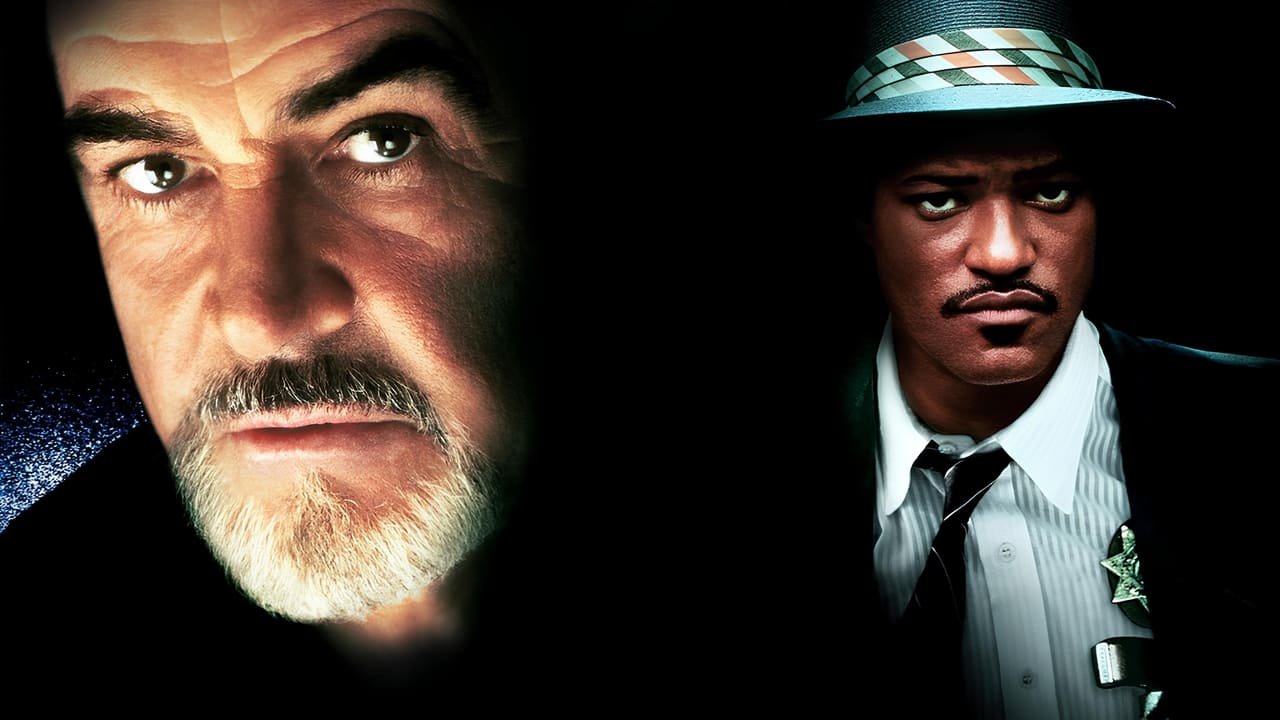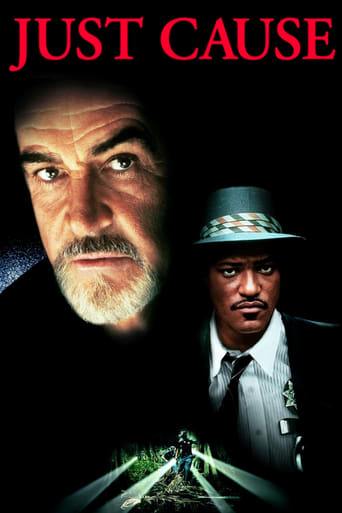

Without saying too much, Just Cause is an appropriate title that suits a few of the characters motivations. You gotta take the characters for what they are. A corrupt black hating cop, Christopher Murray is a nasty and detestable piece of work, really making us think the poor young convict, Blair Underwood, is innocent of committing an atrocious murder of a little black girl. All authorities are quick to point the finger at this girl. Fishburne as another detective of corrupt air, is not much better than Murray, but of much more discretion, ambiguously fascinating as in what makes this guy tick. These two, practically beat tall skinny Underwood, into a confession. Underwood implores Harvard law professor, Connery, to take up his case again, as serial killer monster, an unforgettably evil Hannibal Lector'ish Harris, who's murdered his folks, has confessed to the killing, too. I'm so glad Connery was in this. He made the film, though the solid Harris, is the highlight, and an asset. Just cause is a psychological thriller, but it's a manipulative one too, in the way it shows death row prisoners, pulling the wool over your eyes, using their intellect to befool you, if for notoriety or a bid for freedom where by the end you really feel suckered, as really there wasn't much a puzzle. Okay, it's not the best thriller, but it does make for good dramatic entertainment, especially for people who want to see Connery strut his stuff again.
... View MoreSeems like this movie had two parts,, first, the leadup to what has happened and what we assume to be the conclusion,, second part is where all of the twists come into play,, I have to admit at first that they confused the heck out of me trying to figure it all out,, Sean Connery,, and Laurence Fishbourne star in the movie,, with small supporting roles for Daniel J Travanti and Ned Beaty.. a man is convicted and brutally beaten at a confession and sent to prison,, his grandmother meanwhile goes and sees a retired lawyer who teaches law and begs for his services to review her son's case. He does and discover's that the confession was beaten out of him. He is set free bout halfway thru the movie,, then all of the twists start taking shape,, a pretty decent movie, with lot's of action, a little slow to start,, I won't get into all of the plot twists,, you will just have to watch and see for yourself.
... View MoreGood movie until it spirals out of control at the end. I'm glad someone FINALLY showed NATIVE Floridians. Yes, we do live here (my family's been here for five generations) and there are plenty of us in inland Florida and the Panhandle. Despite what another poster said, most Floridians are from here and still Southern. So, I'm glad to find a movie that portrays we Floridians as we are. That and Ed Harris' character did it for me. Ed Harris truly did a superb job and I loved the mention of Florida State, but the ending was terrible and absurd and featured Laurence Fishburne's on screen daughter talking like a Northerner and letting a strange man (Connery) walk into her house. Anyways, the last 30 minutes was a complete waste of time, but I only really liked it because I'm a Floridian and was proud to see the scenery - even though the constant alligator was a nuisance and cliché.
... View MoreTo fight against the death penalty is a just cause. Everyone who is sane in Europe would think so. In the USA everything is different. The film seems to demonstrate in a first stage that justice can be won against the racist bigot death penalty craving American justice. A young man is freed from death row thanks to a law professor who went back to defense counseling for this particular case. But the film has a sequel. Justice in the USA is entirely governed by the aim of vengeance. Miscarriage of justice is just the same governed by vengeance. One person in the local Public Attorney Offfice has a young man prosecuted on false charges. This Public Attorney's officer drops the charges after a while and the young man walks out free. But he loses his college scholarship and he is castrated by some vengeful people for whom there is never any smoke without a fire. He hides his shame and swears to get his vengeance. But he also needs to satisfy his sexual needs which are more mental than hormonal for sure but even stronger because mental and no longer hormonal and he can only do that with little girls. He apparently teams with another serial killer who is after the same kind of preys. One day the local cops follow their intuition, guided by some vague circumstantial elements in the assassination of a young girl, and they arrest the young chap we are speaking of. They beat him up and interrogate him for 22 hours with nothing but blows and blows and telephone books and guns and Russian roulette. He confesses. Sent to death row, he asks his grandmother to go get the law professor in Massachusetts who is the husband of the Local Public Attorney's representative that had him falsely prosecuted some years ago and the vengeance is on the rails. It will fail but it shows that as soon as one in the line of justice, police work and other security forces steps off the line of absolute legality, some unjust act is done that can ruin even the best accusation case and that can nourish the worst deepest imaginable thirst for vengeance. To charge someone on circumstantial elements is just as bad as to let circumstantial elements ruin the work of the police or of justice. The best intentions on the police side are ruined by some personal involvement and vengeful intention, just as much as the life of a person can be jeopardized by circumstantial elements inflated to the size of evidence, which in its turn will jeopardize the whole case by being just circumstantial, hence easily discardable, with a good lawyer. The film then is a deep reflection on the necessity to respect standards and regulations all along the police and justice line if we don't want to make a mistake, which in its turn of course does not justify the death penalty since anyway it goes against the deepest belief Americans are supposed to have: "We hold these truths to be self-evident , that all men are created equal, that they are endowed by their Creator with certain unalienable Rights, that among these are Life, Liberty, and the pursuit of Happiness." (Declaration of Independence) Life is an unalienable Right that was given to man by his Creator, which means no one but the one who gave it can take it away. Only God can take the life of a person away. The death penalty is the arrogant appropriation of a power that we do not have. Even if we do not evoke God, we cannot justify the death penalty except as an act of vengeance, and here the film shows vengeance is the worst possible motivation in the rendition of justice and in the establishment of public peace. If vengeance is pushed aside there is no other justification for this death penalty. And there can always be a mistake in that pursuit not of Happiness but of vengeance.Dr Jacques COULARDEAU, University Paris 1 Pantheon Sorbonne, University Paris 8 Saint Denis, University Paris 12 Créteil, CEGID
... View More